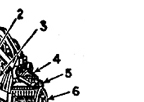INHERITANCE
Out on the porch, out facing the shapeless
dark of moonless night, my father began
to speak of Grandma Lily, still
not conscious after surgery. Before dawn,
he rose from the room he'd grown up in, cluttered
with what he'd always seen as junk,
trinkets his mother hoarded and stirred
to life with prayer to saints she figured
bodily, and good on their promises.
Saint Jude, patron of desperate cases.
Saint Anthony, patron of the lost. Eyes
closed, he walked each room of the house
in his mind. At the hospital, he'd found her
sitting up, in a white hospital gown,
still-black hair combed to small shoulders,
looking calmly out the far window, at dawn,
and at that moment knew she would die
and he would live on. And that he would live
only in light of her living. He shifted his eyes
to us, as if someday we would save him.
INHERITANCE
Philip
Metres
"Inheritance" and "Grandma Ascending the Stair" are part of a cycle of poems that attempt to reconstruct the Brooklyn brownstone at 290 Hicks Street where my Lebanese grandparents and their extended families lived for nearly all of the 20th century. The loss of the house in the 1990s seemed to me the objective correlative of the loss of an immigrant generation—their stories and their silences, their impossible unconditional love and their feuds, their utterly unique personalities, and their constantly confounded desire to be close to one another, often living if not in the same house then certainly on the same block. I have been attracted to the religious practice of venerating one's ancestors, a practice that makes both biological and spiritual sense. I hope that these elegies comprise, if not the foundation, then at least the architectural plan for the spirit house of the dead.
